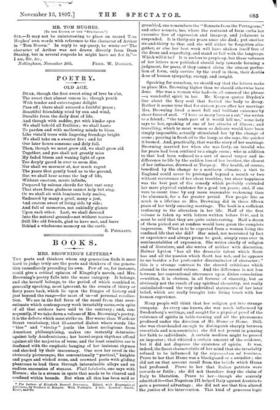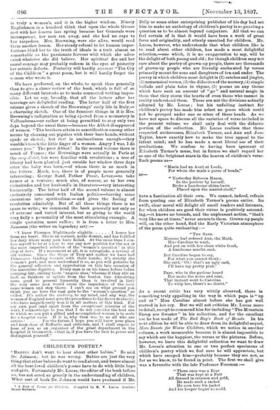BOOKS.
MRS. BROWNING'S LETTERS.*
THE poets and thinkers whom any generation finds it most hard to judge truly are the poets and thinkers of the genera- tion immediately preceding its own. Few of us, for instance, could give a critical opinion of Kingsley's novels, and Mrs. Browning's poetry falls into the same category. It belongs, and she herself belongs, to the period of which mankind is, generally speaking, moat ignorant, to the events of thirty or forty years back, which lie upon the fringes of history and just beyond the range—for most of us—of personal recollec- tion. We are in the full force of the recoil from that over- estimate which contemporary work invariably earns,—in spite of all that authors have said to the contrary ; and, con- sequently, if we take down a volume of Mrs. Browning's poetry, it is the defects which most strike us. Her worse than Wardonr Street vocabulary, that ill-assorted dialect where words like " blee" and " virelay " jostle the latest neologisms from American philosophising, makes one instantly determine against lady Academicians ; her barrel-organ rhythms offend against all the majesties of verse, and the least sensitive ear is deafened with the emphatic banging of her insistent rhymes and shocked by their inaccuracy. One sees her revel in the obviously picturesque, the conventionally "poetical," knights and pages and wicked nuns, and crowned poets with gliding phantoms to lead them through interminable alleys and an endless succession of stanzas. Emit lutulenta, one says with Horace ; she is a stream in spate that needs to be cleared and confined within bounds. But when all this has been said or • The Lettors of Elizabeth Barrett Bromning. Edited. with Biographical Additions, by Frederic G. Kenyon. With Portraits. 2 vols. London : Smith, Elder, and Co.
grumbled, one remembers the "Sonnets from the Portuguese," and other sonnets, too, where the restraint of form curbs her excessive flow of expression and imagery, and judgment is suspended. It is thirty-six years since she died; put another six-and-thirty to that and she will either be forgotten alto- gether, or else her best work will have shaken itself free of the dross and superfluity, and stand or fall with the language. Which will it be? It is useless to prophesy, but these volumes of her letters now published should help towards forming a judgment, for poets, if they cannot claim the utmost perfec- tion of form, only survive by the stuff in them, their double dose of human sympathy, energy, and insight.
Speaking for ourselves, we should say that the letters make us place Mrs. Browning higher than we should otherwise have done. She was a woman who had—in all senses of the phrase —a wonderful spirit in her. Mr. Kenyon quotes Dryden's line about the fiery soul that fretted the body to decay. Rather it seems true that for sixteen years after her marriage Mrs. Browning lived a most full and brilliant existence by sheer force of soul. "I have as many lives as a cat," she writes to a friend ; "the tenth part of it would kill me," some lady says to her, speaking of one of her attacks of illness ; and travelling, which to most women so delicate would have been simply impossible, actually stimulated her by the change of scene ; pouring in fresh oil to the lamp, as she says, the quicker it burned. And, practically, that was the story of her marriage.
Browning married her when she was forty, an invalid who for years had been confined to a single room ; who in addition to that had been reduced to a sort of moral torpor and in- difference to life by the sudden loss of her brother, the closest of her intimates, drowned at Torquay. Her health, of course, benefited by the change to a southern climate; a visit to England could never be prolonged beyond a month or two without recurrence of her chest troubles; but sheer happiness was the best part of the remedy which probably extended her mere physical existence for a good ten years; and, if one were to count time by any more reasonable reckoning than the almanack, for a far greater period. Few people live as much in a lifetime as Mrs. Browning did in those fifteen years of her truly amazing marriage. The book is a sufficient testimony to the alteration in her life. Half of the first volume is taken up with letters written before 1846, and it must be said that they are quite uninteresting. Half a dozen of them picked out at random would have given the complete impression. What is to be expected from a woman living the confined life that she did ? Her mind, not nourished by fact or experience and always prone to gush, simply runs over in sentimentalities of expression. She writes chiefly of religion and of literature, and she writes of neither with discretion. Bulwer Lytton "has all the dramatic talent which Scott has and all the passion which Scott has not, and he appears to me besides a far profounder discriminator of character ; " this is a strange contrast to the shrewd criticisms which abound in the second volume. And the difference is not less between her conventional utterances upon divine consolation —written, it is obvious, in all fervour of sincerity, but as obviously not the result of any spiritual chemistry, not really assimilated—and the very individual statements of her later belief, which are really brought into living touch with her human experience.
Many people will think that her religion got into strange company. As every one knows, she was much influenced by Swedenborg's writings, and sought for a physical proof of the existence of spirits in table-turning and all the phenomena produced under the direction of Mr. Hume or Home. Still, she was clear-headed enough to distinguish sharply between essentials and non-essentials ; she did not persist in pinning her faith to individuals. A certain medium might be proved an impostor; that vitiated a certain amount of the evidence, but it did not disprove the existence of spirits. It was, indeed, the finest characteristic of her mind that she invariably refused to be influenced by the argument urn ad hominem. Prove to her that Hume was a blackguard or a swindler ; she did not on that account recoil from the beliefs which Hume had professed. Prove to her that Italian patriots were cowards or futile ; she did not therefore deny the claim of Italy to liberation. Prove to her—though she scarcely admitted it—that Napoleon III. helped Italy against Austria to gain a personal advantage ; she did not see that this altered the justice of his intervention. This kind of generous logic
is truly a woman's, and it is the higher wisdom. Ninety Englishmen in a hundred think that upon the whole Greece met with her deserts last spring because her Generals were incompetent, her men ran away, and she had no caps to her torpedoes. Mrs. Browning, were she alive, would read them another lesson. Her steady refusal to let human imper- fections blind her to the truth of ideals is a trait almost as remarkable as the passionate fervour with which she advo- cated whatever she did believe. Her spiritual fire and her moral courage may probably redeem in the eyes of posterity her artistic defects. Posterity will hardly account "The Cry of the Children" a great poem, but it will hardly forget the woman who wrote it.
We have preferred, on the whole, to speak thus generally than to give a closer review of the book, which is full of so many different interests as to make connected writing impos- sible. Let us say, broadly, that all the letters after her marriage are delightful reading. The latter half of the first volume gives a sketch of the Brownings' early life in Italy,— a charming sketch. One of the funniest things in it is Mrs. Browning's indignation at being ejected from a monastery in Vallombrosa—or rather at being permitted to stay only two days beyond the usual three—because the Abbot disapproved of women. "The brothers attain to sanctification among other
means by cleaning out pigsties with their bare hands, without spade or shovel; but that is uncleanliness enough—they wouldn't touch the little finger of a woman. Angry I was, I do assure you." The poor Abbot ! In the second volume there is much of France; the Brownings were actually in Paris at the coup d'etat, but were familiar with revolutions ; a tree of liberty had been planted just outside her window three days alter the baby was born,—of whom there is so much in
the letters. Much, too, there is of people more generally interesting ; George Sand, Father Prout, Lever,—to take names at a venture ; much also, of eourse, as to her own vicissitudes and her husband's in literature—very interesting
historically. The latter half of the second volume is almost exclusively concerned with Italian politics—barring some excursions into spiritualism — and gives the feeling of
revolution admirably. But of all these things there is no space to write ; we commend the book generally not only as of extreme and varied interest, but as giving to the world very fully a personality of the most stimulating example. A single quotation must suffice ; it is from a letter to Mrs. Jameson (the writer on legendary art) :—
"I knew Florence Nightingale slightly I honor her from my heart. She is an earnest, noble woman, and has fulfilled her duty where many men have failed. At the same time I con. teas myself to be at a loss to see any new position for the sex or the most imperfect solution of the 'woman's question' in this step of hers. If a movement at all, it is retrograde, a revival of old virtues. Since the Siege of Troy and earlier we have had Princesses binding wounds with their hands ; it's strictly the woman's part, and men understand it so, as you will perceive by the general adhesion and approbation on this late occasion of the masculine dignities. Every man is on his knees before ladies carrying lint, calling them angelic shes,' whereas if they stir an inch as thinkers or artists from the beaten line (involving more good to general humanity than is involved in lint) the very same men would curse the impudence of the very same women and stop there. I can't see on what ground you think you see here the vast gain to the woman's question' so called. It's rather the contrary, to my mind, and any way, the women of England must give the precedence to the Swurs de charit who have magnificently won it in all matters of this kind. For toy own part (and apart from the exceptional miseries of the war), I acknowleblge to you that I do not consider the best use to which we can put a gifted and accomplished woman is to make her a hospital nurse, if it is, why then woe to us all who are artists For the future I hope you will know your place and keep clear of Raffaele and criticism, and I shall expect to hear of you as an organiser of the gruel department in the hospital at Greenwich, – that is, if you have the luck to pereer and distinguish yourself."







































 Previous page
Previous page